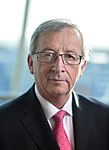Luxembourgish legislative election, 2009
|
|
|||||||||||||||||||||||||||||||||||||
|---|---|---|---|---|---|---|---|---|---|---|---|---|---|---|---|---|---|---|---|---|---|---|---|---|---|---|---|---|---|---|---|---|---|---|---|---|---|
|
|||||||||||||||||||||||||||||||||||||
|
|
|||||||||||||||||||||||||||||||||||||
|
All 60 seats in the Chamber of Deputies 31 seats were needed for a majority |
|||||||||||||||||||||||||||||||||||||
|
|||||||||||||||||||||||||||||||||||||
|
|||||||||||||||||||||||||||||||||||||
General elections were held in Luxembourg on 7 June 2009, together with the 2009 election to the European Parliament. All sixty members of the Chamber of Deputies were elected for five years. The polls were topped by the Christian Social People's Party, which built upon its already high number of seats to achieve a commanding victory, with the highest vote share and number of seats of any party since 1954. Incumbent Prime Minister Jean-Claude Juncker, who is longest serving head of government in the European Union, renewed the coalition agreement with Deputy Prime Minister and Luxembourg Socialist Workers' Party leader Jean Asselborn and formed the Juncker-Asselborn Ministry II, which was sworn-in on 23 July 2009.
Seven parties ran candidates in all four circonscriptions, of which, five were already represented in the Chamber of Deputies: the Christian Social People's Party (CSV), the Luxembourg Socialist Workers' Party (LSAP), the Democratic Party (DP), the Greens, and the Alternative Democratic Reform Party (ADR). Two parties that were not then represented also ran: The Left and the Communist Party (KPL). In addition, the Citizens' List, which was headed by current independent deputy Aly Jaerling, ran in two constituencies.
...
Wikipedia



